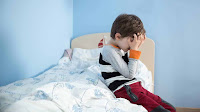Bed wetting is quite a common occurrence amongst young children, however bed wetting is concerning after the age of 5 years, not only socially, as it can be an embarrassing occurrence for children to go through, but it also is an indication and sign of breathing disturbances during sleep.
Recent studies show that there are numerous links between bed wetting and Obstructive Sleep Apnoea (OSA). These studies also highlight that children with OSA often have a high palate, a more vertical facial growth pattern and nasal obstruction.
Does sleep apnoea in children lead to bed-wetting?
Yes. There is very strong evidence to suggest that your child's bed-wetting could be a symptom of poor sleep health.
When there are changes in obstructed breathing, this causes the blood pressure changes in the abdomen, hindering the bladder’s capacity to hold urine. The increased stress in blood pressure also leads to the release of hormones and sodium ions that increases urine production and excretion.
How do I get my kid to stop wetting the bed?
You're reading this because you've probably already tried encouraging your child; scheduling toilet breaks; shifting drinking times; and likely many other tactics. Right now you might even be running out of clean bedsheets to put on your child's bed.Don't worry. There is a more scientific approach to helping your to stop wetting the bed.
Because we already know that poor sleep habits can lead to bed-wetting in children, let's work out whether your child's bed-wetting is a result of some form of sleep apnoea.
- Snoring, even if it's no very loud
- Difficulty breathing at night
- Breathing with their mouth open
If your child shows these symptoms, our gentle and patient children's dentists may be able to help.
Solutions like removal of adenoids and tonsils as well as palate expansion have proven to show great outcomes in reducing bed-wetting and better sleep quality.A widened palate can also reduce resistance to airflow, and improve breathing outcomes in children. Due to new digital technology, this widening can be achieved with new techniques such as Myofunctional therapy or Myobrace, as it's commonly known.
Our gentle and patient gentle and patient children's dentists will be able to discuss the options with you and help you choose an option that helps your child stop wetting the bed and enjoy a more fulfilling life, but also fits your budget.




















0 comments :
Post a Comment